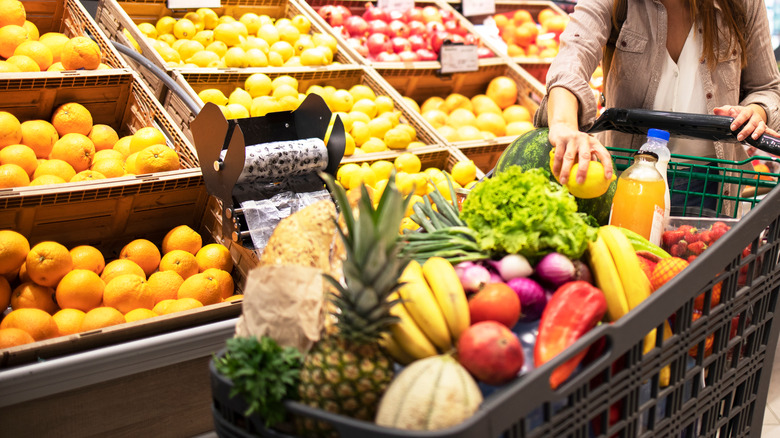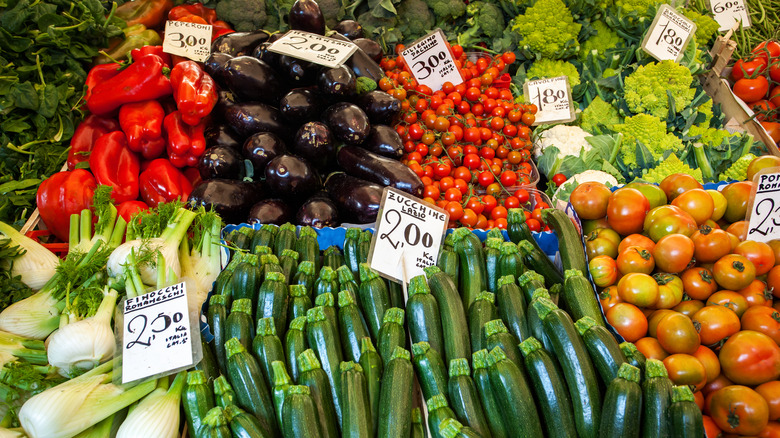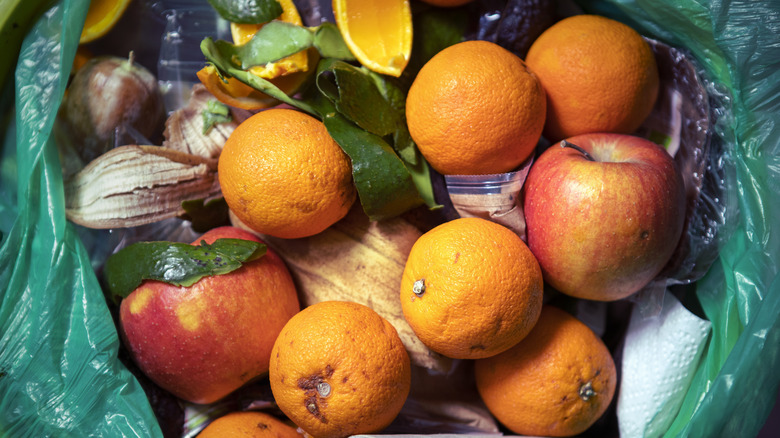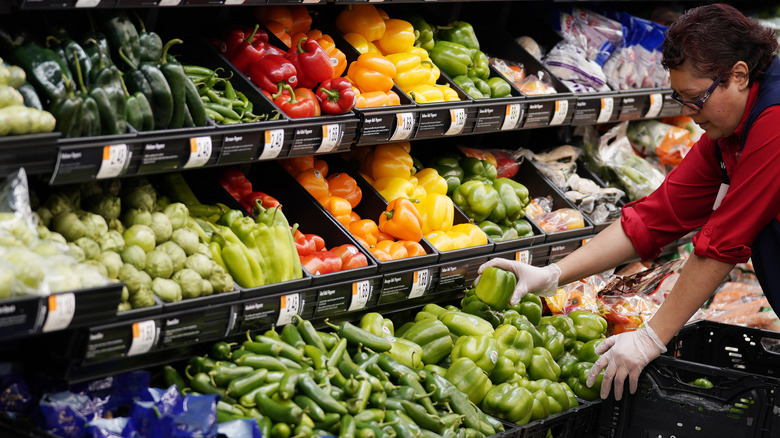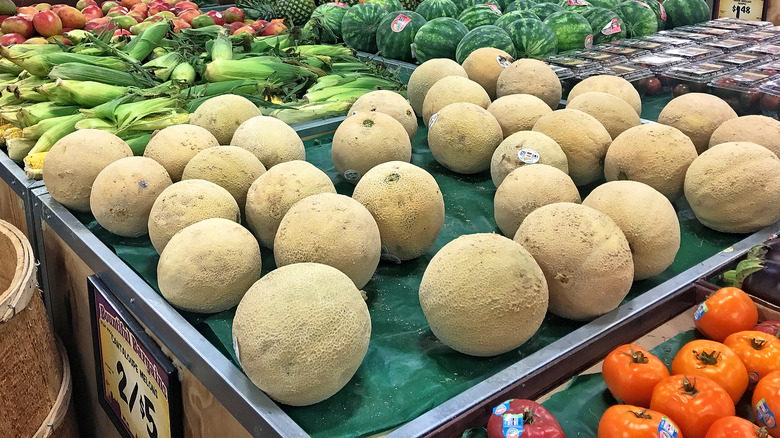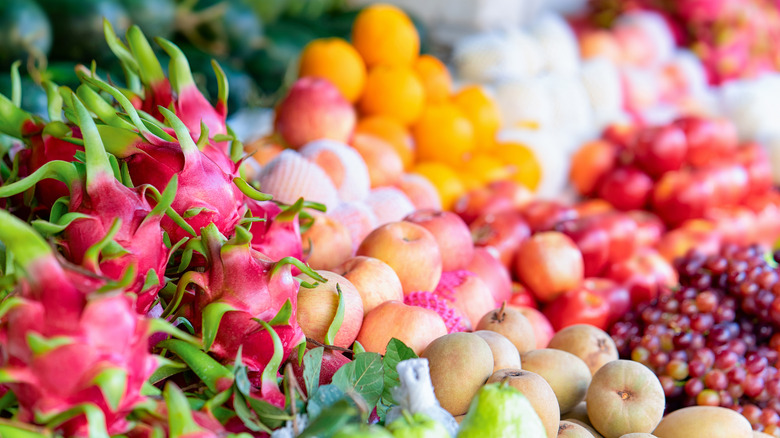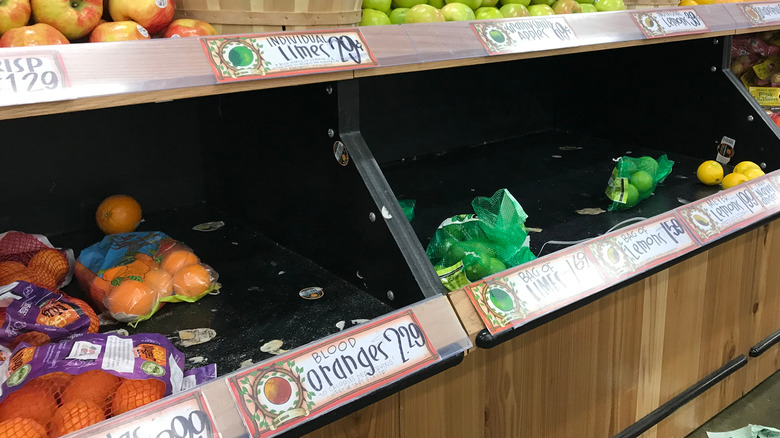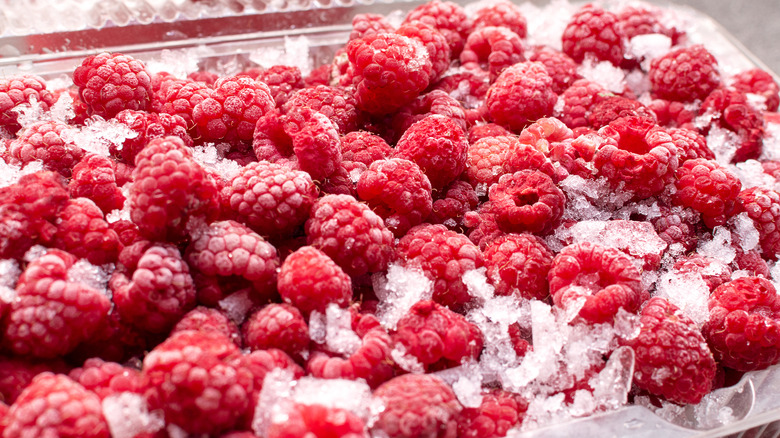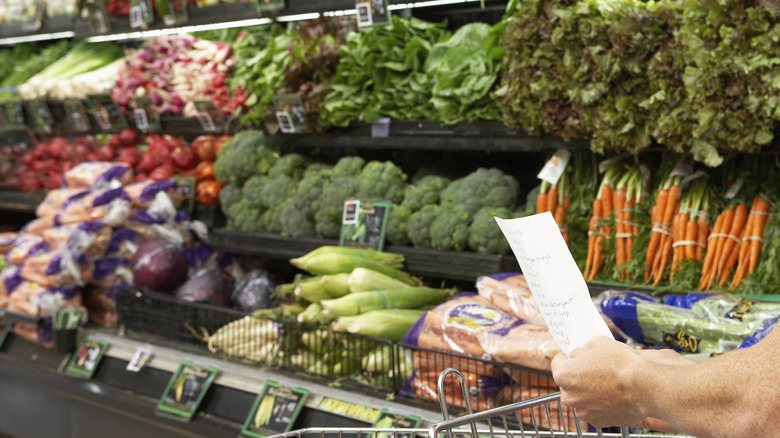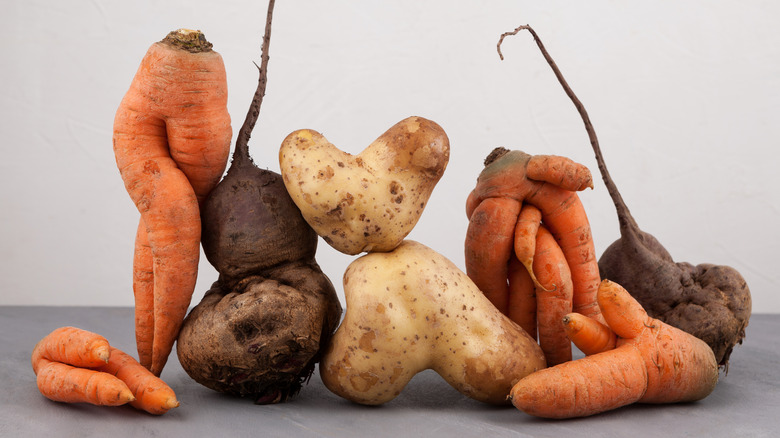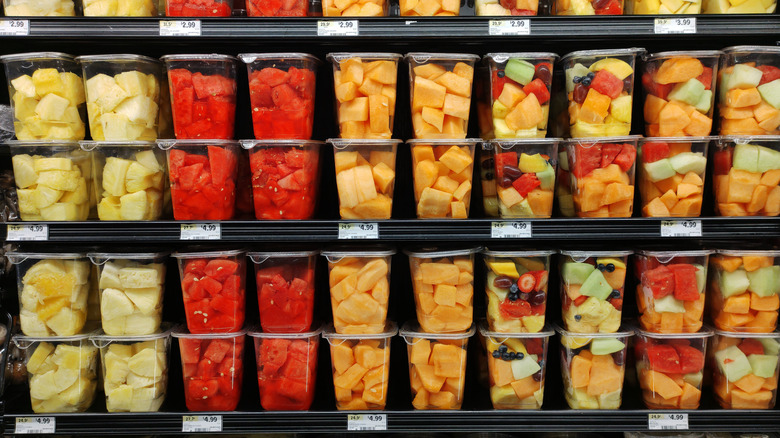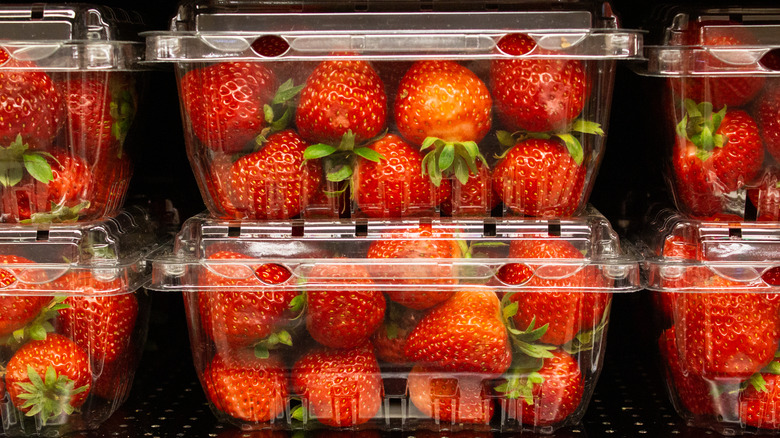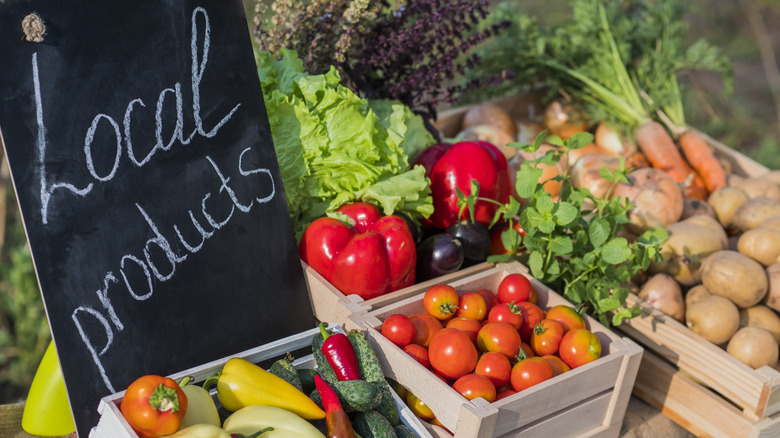Big Mistakes Everyone Makes When Buying Produce
The need to ingest a healthy amount of fruits and vegetables is firmly entrenched in modern U.S. culture — so much so that the recommendation of eating at least five combined servings of fruits and veggies a day has become a mantra of sorts. Yet how many of us actually consistently consume the necessary amount of produce?
Maintaining a healthy diet can feel like an impossible task at times, even when you have good intentions. Have you ever made a concerted effort to increase your fruit and vegetable consumption by purchasing produce, only to find yourself tossing a mushy, mold-ridden zucchini into the trash two weeks later?
While some diligent dining choices will be required on your part, incorporating more produce into your diet can also come down to knowing how to navigate the produce department a little better. By identifying some of the common missteps people make when picking out produce at the grocery store, you can set yourself up for success when buying fruits and vegetables. To help make your next shopping trip more fruitful (pun intended), we're laying out the big mistakes everyone makes when buying produce, and why you'd be wise to avoid repeating them in the future.
Not checking sale items and prices before shopping
It may be hard to understand why anyone would willingly take a trip to the grocery store without a plan in mind, but those folks who decline to check a store's sales or prices ahead of time undoubtedly exist — and in larger numbers than you might suspect.
If you're in the dark regarding the sales and prices found at different grocery stores in your area, you may find yourself inadvertently spending more money than you need to be on your fresh produce. And the reality of inflation's stranglehold on current consumers — spurred in part by the various food shortages around the world — means it's vital to ensure every penny is spent properly. There may be nothing egregiously wrong with choosing to stop by a store's produce department with zero knowledge of what to expect price-wise, but you're far more likely to blow your budget if you do so routinely.
Purchasing produce you have no desire to eat
The U.S. wastes a staggering amount of food each year on both an individual and corporate level, including a substantial number of fruits and vegetables. While we've all been guilty of throwing out more food than we should on occasion, perhaps we'd be less inclined to dispose of what was once perfectly good produce if we focused on buying fruits and vegetables we actually want to eat rather than those we think we should buy but don't actually enjoy.
Just because the old saying tells us an apple a day keeps the doctor away doesn't mean this wisdom is exclusive to apples. In other words, if you abhor apples but buy a bag anyway, well ... what did you think was going to happen once you dumped the fruit into the bowl on your kitchen counter? Quite frankly, this one mistake could be why some folks claim to dislike all fruits and vegetables when in reality, they simply despise the same old produce they buy, and eventually throw out, ad nauseam.
Buying produce from a store with a mediocre selection
There's no way around it — some stores sell higher quality products to customers than others, particularly when it comes to fresh and perishable items like fruits and vegetables. In that sense, if you're not consuming or enjoying the produce you bring home from a store, the problem may lie in the source. If you're buying fruits and veggies from a place with a substandard or minimal selection, you're likely making a big mistake.
Now, we don't mean to imply there's absolutely nothing worth purchasing from businesses known to offer lower-quality produce (we're looking at you, Walmart). Yet at the same time, there's a reason why 33% of voters chose Walmart's produce selection as the worst overall in a 2021 Mashed survey — and why it ranked near the bottom of a 2019 consumer survey regarding produce departments at a number of grocery chains.
Perhaps you think all watermelons and broccoli heads are created equal and don't need more than a small handful of fruits and veggies to choose from to be happy. But if you aren't satisfied with the quality of your produce, or find yourself longing for a more diverse selection, consider skipping those stores whose produce departments have a negative reputation.
Not smelling a cantaloupe before buying it
In most cases, it's impossible to be able to predict precisely how a piece of fruit looks on the inside before you cut or bite into it. Luckily, there's some tricks of the trade available to help ensure you maximize your fruit purchases before departing the grocery store. Along those lines, if you're not smelling a cantaloupe before adding it to your cart or basket, you may find yourself digging into an under-ripened or rotting melon later on.
Thankfully, the exceptionally easy step of sniffing the fruit can help determine if a cantaloupe has gone bad before you buy it. A cantaloupe worth spending money on will emit a gently sweet aroma rather than a rank, off-putting stench. Conversely, if you don't smell anything when performing a cantaloupe sniff test, be wary, as this means it hasn't matured enough and should also be skipped. Maybe you're worried about looking foolish by engulfing a cantaloupe's scent in a public produce department. But if you're more concerned with getting your money's worth, what's a little self-consciousness to overcome?
Skipping unknown or unfamiliar produce entirely
While there's a certain understandable comfort derived from familiarity, the fact that we live in a big world with countless culinary cultural differences means there's no discernable reason why a person should willingly eschew new things. In that sense, if you find yourself bored with the same old produce you purchase after each and every trip to the grocery store, you may want to consider broadening your horizons to the unknown and unfamiliar.
We don't mean to denigrate anyone who opts to stick to their tried-and-true produce products. But there's just so much variety beyond the standard fruits and vegetables typically seen in produce departments. Abd with so many additional fruits and vegetables available that are foreign to the U.S. palate, you simply never know what you're missing out on. If you tend to give a side-eye to any new or unusual-looking produce, don't run away. Life is nothing if not a series of adventures, after all. So why not open yourself up to new opportunities when it comes to your fruit and vegetable purchases?
Shopping at the end of the sales period when pickings are slim
It goes without saying that most businesses sell products on a first-come, first-serve basis. Of course, even if this wasn't a standard practice, the perishable nature of certain foods, like fruits and vegetables, means there's a limited window of opportunity to purchase and eat those items.
So if you're eager to shop in a produce department that's fully stocked with the freshest possible fruits and veggies, don't make the mistake of waiting until the end of a sales period to do so. You'll only be limiting your potential produce choices in the process. Shopping at the beginning of a store's sales week soon after it restocks will provide a more plentiful bounty of fruits and vegetables to choose from when compared to the end of the sales week.
If you shop at the very start of a store's sales week (often on Wednesdays), you won't just have your pick of the litter when it comes to produce. You can also increase any potential savings if you time your trip right. That's the day that many promotions starts. On top of that, you may be able to obtain fruits and vegetables from the prior sales period — those a store is eager to sell off rather than dispose of or donate — at a reduced rate, as well.
Sticking to fruits and vegetables that aren't in season
We all have our favorites in life, particularly when it comes to produce. Of course, if you insist on remaining loyal to your preferred foods to the point of stubbornness by, say, continuing to purchase certain fruits and vegetables that are out of season, then you'll be guilty of committing another big mistake a lot of people make when buying produce.
For one thing, if you don't think twice before buying produce that's out of season, you'll likely find yourself eating poorer tasting fruits and veggies while paying a premium for those lackluster products. After all, the concept of supply and demand dictates that when a product is less plentiful — like with off-season produce — it's going to cost more.
Of course, we don't mean to discourage anyone from obtaining their required daily intake of fruits and vegetables by demanding they steer clear of all produce that's out of season. For instance, if you flat out refuse to consider any other fruit besides blueberries, then feel free to grab a pint all 12 months of the year. Just be prepared to pay a bit more for a subpar product at times.
Choosing to wing it rather than make a list before shopping
Not unlike the common advice to avoid grocery shopping on an empty stomach, it's never a good idea to go to the supermarket sans list. Shoppers without a plan are more prone to forget essential items or accidentally exceed their budget due to unexpected purchases. More than that though, skipping a grocery list means there's a better-than-average chance you end up with too much or too little from the produce department.
We understand that there are those out there who are averse to creating a grocery list. But it's worth pointing out that this simple task will help you maximize your time and your budget. And unless you're opposed to the notion of saving dollars, or decreasing the odds you'll impulsively purchase exorbitantly priced or unappealing fruits and vegetables, there's little reason to continue making this common produce mistake. After all, there's ample opportunity for spontaneity in life outside of the grocery store.
Ignoring ugly or unattractive fruits and vegetables
There's more than enough evidence to suggest beauty truly is in the eye of the beholder. Of course, the notion that beauty isn't just skin deep doesn't apply solely to human beings but also your produce. And more recently, the general public's perception of so-called ugly produce is shifting slowly. While there's no defensible reason to skip less visually appealing produce, many of us do still avoid fruits or vegetables that weren't tailor made for a photo shoot — and fall victim to this common mistake as a result.
To be perfectly clear, there's virtually no health risks involved with eating a fruit or vegetable that looks more like the Elephant Man than a standard pineapple or carrot. Sure, it may take a tad more care and attention to properly prepare a piece of ugly produce before eating or cooking it. But you can rest easy knowing you're not risking your well-being by utilizing a potato that appears to have legs, so long as there's no visible mold or rotting spots.
Realistically, avoiding this common produce mistake may be more related to a reduction of humanity's overall food waste than anything else. But since we can't ensure the planet's long-term survival without cooperative efforts, why not consider a not-so-beautiful apple or tomato on your next trip to the produce department?
Buying pre-cut or pre-prepared fruits and vegetables
The crushing inflation we've dealt with in recent years means every dollar is a luxury in 2023. Along those lines, if your goal when grocery shopping is to minimize expenses, it's vitally important you pass on any obviously overpriced items, even when it seems inconvenient to do so. While we've all likely purchased pre-cut fruits or vegetables from the produce department at some point, if you do so too often, your bank account is bound to suffer the consequences.
It's not too hard to see why pre-cut and pre-prepared produce is usually priced at a premium compared to whole, untouched items. Such products save consumers both time and effort, and many folks are willing to pay a pretty penny for that. Still, the price difference between pre-cut and whole produce can be downright staggering at times, and is bound to take a legitimate financial toll if you make buying pre-cut products a habit.
It may be both preferable and necessary to settle on pre-cut fruits or vegetables in certain situations, but it's not the most cost-effective strategy. Since that category of produce tends to spoil quicker while offering a diminished level of nutrients as well, be sure to avoid making the mistake of buying pre-cut produce on a regular basis.
Expecting strawberries to ripen after purchase
When it comes to fruit, it's tough to top strawberries' all-encompassing wondrousness, as long as you've gotten your hands on a perfectly ripe berry. Of course, if you're one of the many individuals who's previously purchased a container of under-ripe strawberries hoping they would continue to ripen after leaving the store, you've likely discovered (with devastating disappointment) that strawberries don't ripen further after being picked, whether in the store or in your kitchen.
This common error when buying produce may be the easiest one to wrap your head around. After all, the fallacious misconception that a strawberry continues to ripen once picked may result from the fact that other fruits — like bananas and avocados — do in fact keep maturing after removal from a plant.
Either way, if you've committed this common mistake in the past, there's a fairly straightforward solution: Be sure to choose fully ripened strawberries from the produce department. Look for berries that are bright red and lustrous, and skip strawberries with any visible green or white spots.
Not buying produce from your local farmers market
While we acknowledge that not everyone is lucky enough to have access to a local farmer's market, if you do happen to have one in your area, you'd be making a big mistake if you don't peruse the stands to buy your fruits and vegetables.
There are plenty of good reasons to shop at your local farmers market for produce. Since fruits and vegetables at farmers markets are in season and locally grown, they're almost always fresher than the alternatives at grocery stores, some of which may have been picked weeks or months before appearing in the produce department. Additionally, farmers markets often showcase lesser-known produce, meaning you may discover a new favorite fruit or veggie while there. And if you're not sold by our recommendation, perhaps you'll trust the words of celebrity chef Giada de Laurentiis, who is a big proponent of obtaining produce from a farmer's markets as well.
